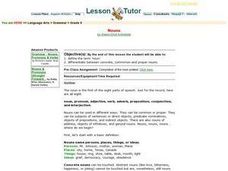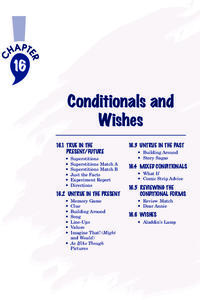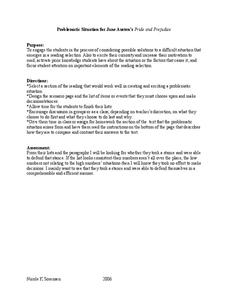WITS Program
Whoever You Are
Deep down, everyone is the same. Discuss the similarities and differences between people across cultures with a series of reading activities based on the beautiful story and illustrations in Whoever You Are by Mem Fox.
Center for Learning in Action
Introduction to the States of Matter
Liquids, gases, and solids are the states of matter in which scholars investigate in a lesson plan that offers in-depth information and engaging activities that look into the three states and the changes their properties make when mixed...
EngageNY
Modeling with Polynomials—An Introduction (part 1)
Maximizing resources is essential to productivity. Class members complete an activity to show how math can help in the process. Using a piece of construction paper, learners construct a box with the maximum volume. Ultimately, they...
Peace Corps
Brief Encounters
How are Pandyas different than Chispas? Explore cultural norms and societal behaviors with an engaging role-play activity. Split into groups of two hypothetical cultural groups, the formal Pandyas and the sociable Chispas, and another...
Nosapo
Shopping for Clothing
Let's go shopping! A series of activities focus on vocabulary words related to articles of clothing and shopping for clothes. Additionally, learners complete sentences using how much and how many.
American Press Institute
Newspapers in Your Life: What’s News Where?
Big news isn't necessarily newsworthy everywhere! How do journalists decide what to cover with so much happening around them? A instructional activity on media literacy examines the factors that affect the media's choice of stories to...
California Academy of Science
Rapid Brainstorming: How Can We Conserve Our Water Resources?
Water covers around 75 percent of the earth, yet humans struggle to find enough fresh water to live. The fourth of 10 lessons focusing on Fresh Solutions requires brainstorming. Young scientists consider various problems related to fresh...
University of Arkansas
Human Rights
What basic rights are guaranteed to all Americans? Do citizens, legal aliens, illegal aliens, and minors all have the same rights? Should individuals all over the world enjoy the same rights? Class members read the Declaration of...
Savvas Learning
Nouns
Singular and plural. Count and noncount. Nouns are the focus of this 19-page grammar packet. Language learners complete a series of exercises ranging from fill-in-the-blank questions to word puzzles and more in order to further their...
Savvas Learning
Conditionals and Wishes
Conditional constructions (If I were, if he had, etc.) are the focus of a 29-page grammar packet packed with exercises for language learners.
Curated OER
Rediscovering Forgotten Women Writers
Women's voices are becoming more prominent in the world of literature, but for centuries, this wasn't the case. Young historians research a woman whose writings are considered to be lost, out of print, or forgotten. They develop an oral...
Curated OER
First Day of School
Primary learners complete pre reading, writing, during reading, and interdisciplinary activities for the book First Day of School. They will complete journal entries, answer short answer questions, have discussions, and much more.
Illinois Department of Natural Resources
Section Two: Why is Biodiversity Important?
Explore soil, genetic traits, natural resources, and pollution in a series of lessons that focus on biodiversity. Kids complete experiments to learn more about the importance of varied genes and organisms in an ecosystem.
August House
Anansi Goes to Lunch - Pre-Kindergarten
In a multidisciplinary lesson plan, you will focus your instruction around the West African folktale, Anansi Goes to Lunch by Bobby and Sherry Norfolk while your little learners sing songs, play games, participate in a grand...
Curated OER
Making a Ten
An addition table supports third graders as they learn strategies to improve their math fluency. When finding sums greater than ten, students are taught how to first make a ten and then add on the rest. A similar method is also...
University of Kentucky
The Great Spider Debate
Poor, misunderstood spiders! They are feared, disrespected, and detested by many people, yet they do so many positive things. A great addition to any insect unit, learn about some of the more common spiders, while hopefully dispelling...
Curated OER
1984 by George Orwell
Readers of Nineteen Eighty-Four engage in a close reading exercise that directs their focus to the key details Orwell provides in the opening paragraphs to introduce his dystopian society. The included worksheeet is divided into three...
Illustrative Mathematics
Christina's Candies
Help Christina figure out how many chocolate and lemon candies she has with a lesson on decomposing numbers. When presenting this context to the class, the teacher chooses the total number of candies and the number that are chocolate,...
Illustrative Mathematics
Ordering Numbers
Deepen the number sense of young mathematicians with this unique ordering exercise. Given a list of the numbers 1, 5, 10, 50, and 100, young learners must determine where the numbers from a second list fit in the sequence. To increase...
Curriculum Corner
Digraph Word Sort Recording
Young readers sort their way through a deck of word cards in order to become familiar with four common spelling patterns. Focusing on the ch-, sh-, wh-, and th- consonant digraphs, students draw cards and write each word in the box...
Curated OER
Pride and Prejudice: Problematic Situation
What would you do if your sister ran off with a man whom you didn't trust? Explore a scenario based on Jane Austen's Pride and Prejudice. Once kids work though the problem, they read the appropriate chapters from the book and write a...
ESL Kid Stuff
Describing Things (Adjectives)
Describing things using adjectives is the focus of this lesson designed for language learners. Class members play games, draw pictures, and sing songs, adding adjectives to describe animals.
Leicestershire County Council
Developing Handwriting Skills for Individuals with Autistic Spectrum Disorder
Here is a resource packed with strategies to help individuals with ASD improve their handwriting skills. Intended for the teacher or specialist, the resource provides background information on reasons learners with ASD have difficulty...
Museum of Disability
Rolling Along
Kindness and empathy can be as important as reading comprehension skills, especially for younger learners. Reinforce both with a lesson based on Rolling Along: The Story of Taylor and His Wheelchair by Jamee Riggio Heelan. As...

























